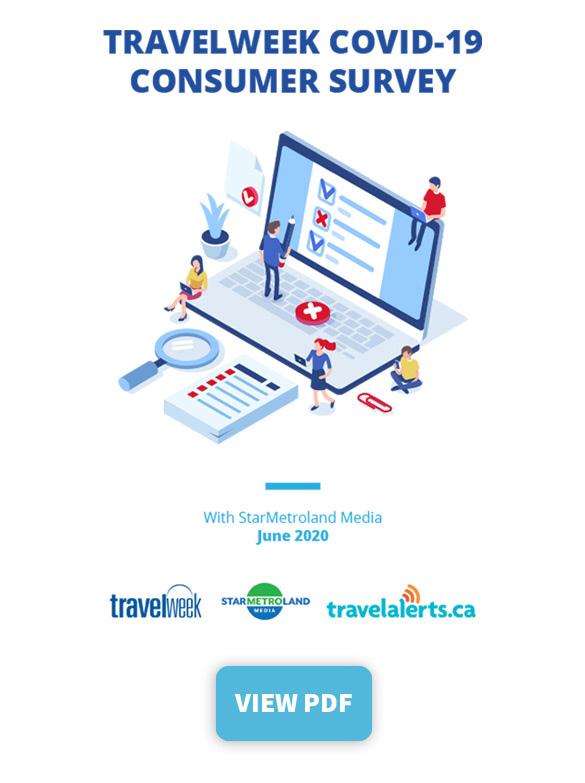TORONTO — The latest challenge for the travel industry will be getting clients to feel comfortable booking travel for a post-pandemic world, at least for the short term, according to new findings from Travelweek’s COVID-19 Consumer Survey.
The survey, in partnership with Star Metroland and garnering close to 3,000 responses from consumers across Canada, indicates that 65% of respondents are not willing to book travel now for 2021, compared to 35% who said they would book now for next year.
When asked how soon after travel restrictions are lifted will they travel again, 34% of respondents said they would within four to six months, 32% said within one to three months, and 24% said they wouldn’t travel until seven months or longer. Only 10% said they would travel less than one month of restrictions being lifted.
In order to entice them to book future travel, nearly 28% of respondents said flexible cancellation policies would be the most important consideration, followed by price discounts (19.8%). Cleanliness/social distancing policies (19.3%), destinations with low numbers of COVID-19 (19.2%) and quality product (13.8%) rounded out the list of considerations when booking travel now.
As for when consumers foresee travel restrictions easing, 51% said 2021, 41% said sometime in fall/winter 2020, while a very optimistic 7% are hopeful that travel will open up again this spring/summer.
Speaking with Travelweek via email, Jennifer Hendry, Senior Research Associate at the Canadian Tourism Research Institute says the U-shaped recovery curve is expected to be drawn out.
“The return of transborder activity will be dependent on how the pandemic is managed in the U.S., but outbound travel is not expected to resume until July at least,” she says. “We don’t expect transborder and other overseas activity to operate at/above the level experienced prior to the outbreak until later in 2021.”
Hendry also notes that domestic travel will be the first activity to regain ground once physical distancing measures are eased. Short-haul and, potentially, transborder drive trips would be next, followed by transborder air. International air travel will be the last segment to recover.
“The recovery will be boosted by price incentives and pent-up demand, as well as travel credits issued when trips were cancelled,” she adds.
With 55% of respondents saying their household income has been negatively impacted by the pandemic, travel deals will be an essential incentive for travellers moving forward. According to survey results, 32% of respondents said a discount of 50% or more would entice them to book travel for summer and fall 2020, while 12% said slashing prices by 25%-49% would suffice. Only 8% said they wouldn’t need a discount at all to entice them to travel once the pandemic is contained.
The majority of respondents, 47%, said they aren’t willing to travel at all this summer/fall, no matter how big of a travel discount is being offered.
Despite the immediate benefit travel deals will have on restarting the industry, Hendry is quick to warn companies of its long-term impact.
“Consumers will be more price conscious, but tourism businesses will have to be careful about cutting their prices too much as a severe drop will result in a longer return to pre-COVID-19 pricing,” she says.
When navigating through ‘the new normal’, Hendry says that the biggest hurdles facing the travel industry in terms of getting people to book trips again are concerns over health and safety, and the lack of discretionary income.
“Destinations, tour operators and other tourism businesses can’t control economics and household finances,” she says. “The can, however, be transparent and communicate public health conditions, sanitization procedures and other measures being taken to help protect the health of both community members and visitors.”
As for destinations, Hendry says they will “have to put an emphasis on their openness to receiving visitors again and work with the local community to ensure a welcoming environment.”
To read more results from Travelweek’s COVID-19 Consumer Survey, click here and here.


